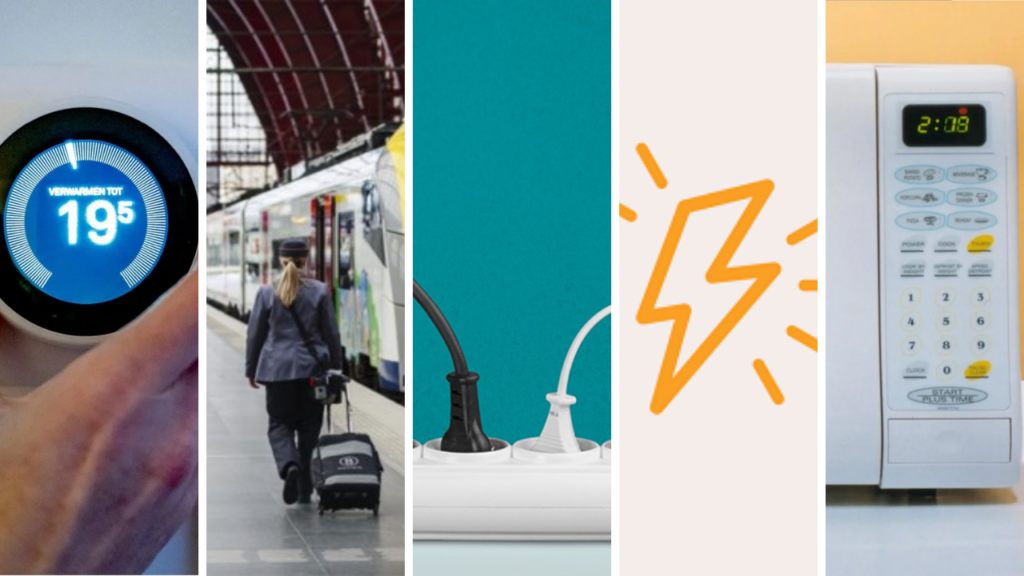On Thursday, Belgium's Federal Government is launching an "I have an impact" information campaign with practical tips to encourage citizens to use less energy and "support Ukraine" that way.
Following last week's call by the Dutch Government for the population to take shorter showers and set the thermostat at a maximum of 19°C to reduce their energy consumption, Belgium is taking a similar route.
The war in Ukraine shows how dependent Europe is on gas and oil from Russia: Belgium imports 30% petroleum, 20% uranium and up to 6% natural gas from the country. "Be smart with energy, that is how we help Ukraine. Because 11 million small actions make a very big difference," the campaign's website states.
"Nobody can predict how the conflict will evolve but we can already prepare ourselves. By saving energy together, we help Ukraine and we can quickly reduce the dependence on energy from Russia," said Federal Energy Minister Tinne Van der Straeten.
Tip 1: Set the thermostat 1°C lower
The Federal Government recommends turning down the heating by one degree, as households can save up to €240 per year this way. "Only heat the rooms you are in and close the doors of rooms you are not heating, such as your bedroom or storage room."
Lowering the temperature, even if it is just one degree, can actually make a big difference: a household heating the home with gas consumes 23,260kWh on average, according to the Belgian Federal Commission for Electricity and Gas Regulation (CREG). Per degree, you save 7% energy or 1628 kWh per year.
While everyone can and should indeed do their bit, energy expert Koen Vanthournout told VRT last week that such a campaign will not have a major impact on gas prices. "We should not forget that about half of Belgian gas consumption is accounted for by heavy industry and electricity production. And gas prices are set internationally."
Tip 2: Switch the heating to 'night mode' an hour earlier
Set your heating to 15°C an hour before you go to bed or an hour before you leave home. The heat stays in the house long enough that you will not get cold before.
However, households with underfloor heating should not set their thermostat lower than 17°C or 18°C, because it will take a long time (and a lot of energy) before the house has warmed up again in the morning.
Tip 3: Watch out for energy guzzlers
Energy guzzlers are household appliances that consume a lot of energy, often even when they are not actively being used. The energy label on electrical appliances indicates how energy-efficient an appliance is. The government urges people to take that label into account when buying a new washing machine, television or freezer, for example.
The ideal temperature for a freezer is -18°C, and every degree colder corresponds to 5% extra consumption. Additionally, it is recommended to defrost your freezer as soon as you see ice build-up, as a 2 mm layer of ice consumes 10% more energy.
Related News
- Belgian government energy measures come into force on Friday
- Short showers, discounts and cheap buses: how other countries tackle Europe's energy crisis
- Laundromats feel the pressure from more expensive energy and soap
The energy consumption of the freezer also depends on the ambient temperature difference, meaning that it should be placed in a cellar, garage or another unheated room.
Another simple tip (not mentioned in the government campaign) is to watch the consumption of devices in standby mode. Many electrical appliances continue to consume energy even when you are not actively using them.
In average households, the main causes of standby consumption are computers (with auxiliaries such as extra screen(s), printers et.c), televisions, coffee machines, hi-fi installations and ovens/microwaves with a digital clock.
Tip 4: Move smart
"Walk, scooter or cycle for short distances. It not only keeps you fit, it is also cheap and sustainable," the Government recommends. "For longer journeys, take the bus, tram, metro or train instead of the car wherever possible."
Additionally, drivers are urged to choose fuel-efficient driving: driving 100 km/h on the motorway instead of the 120 km/h speed limit will save you 10% to 15% of fuel consumption.
According to recent research by the European Environment Agency (EEA), however, lowering your speed to 110 km/h can already make a considerable difference as well: 12% less diesel and 18% less petrol.
The Government also pointed to SNCB's Duo Tickets, which allows two people to take the train for the price of just one ticket. More info about the promotion can be found here.
Tip 5: Cook smart
The Government recommends using the microwave to heat up food, as it uses up to four times less energy than induction or gas cookers.
"When you cook on induction plates, you do not use any gas and the energy efficiency is higher. With an induction hob, 90% of the energy generated actually goes into heating the pan, whereas with a gas fire it is only 60%."
Additionally, small habits – like putting a lid on the pot – help while cooking.
"Being smart with energy is good for your wallet, it helps us become less dependent on Russia and it is good for the climate," added Van der Straeten. "These are all small tips with a big impact, because by being smart with energy, households can easily save hundreds of euros."
More information, including on which institutions to contact if you want to renovate and/or insulate your home in Flanders, Wallonia and the Brussels-Capital Region, can be found here (in Dutch) and here (in French).

